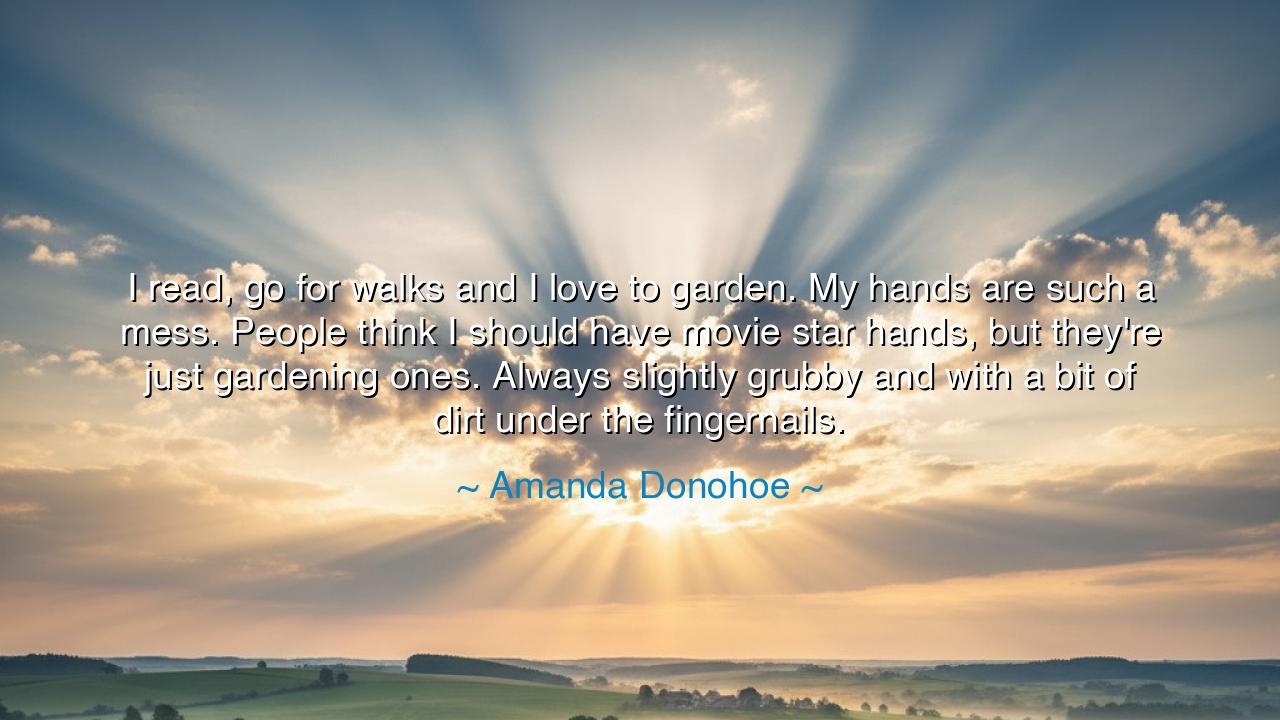
I read, go for walks and I love to garden. My hands are such a
I read, go for walks and I love to garden. My hands are such a mess. People think I should have movie star hands, but they're just gardening ones. Always slightly grubby and with a bit of dirt under the fingernails.






“I read, go for walks and I love to garden. My hands are such a mess. People think I should have movie star hands, but they’re just gardening ones. Always slightly grubby and with a bit of dirt under the fingernails.” Thus spoke Amanda Donohoe, an actress of grace and renown, whose words carry not vanity but truth — the wisdom of one who has learned that real beauty is not found in perfection, but in authenticity. Her reflection, tender and earthy, is a reminder that the hands that create, that work, that nurture, are far more beautiful than those which remain unsoiled and idle. This is not merely a confession about gardening, but a philosophy of life: to embrace the marks of living, to value labor and growth over polish and illusion.
The origin of this quote rests in Donohoe’s life as both artist and human being — one who has walked between the worlds of glamour and groundedness. As an actress, she has long been seen as a figure of elegance, admired for her craft and appearance. Yet beneath the surface of performance lies a simpler joy — the love of the earth, the quiet satisfaction of tending life with one’s own hands. In her words, we sense a rebellion against the empty ideal of flawlessness, and a return to something honest, human, and enduring. She speaks for all who have grown weary of surface beauty, and who long for the deeper grace that comes from living close to the soil, to nature, and to truth.
To say that her hands are “slightly grubby and with a bit of dirt under the fingernails” is not an admission of imperfection, but a badge of honor. The gardener’s hands are symbols of creation, patience, and care. They are scarred by the effort of growth, yet blessed by the reward of life blooming under their touch. In the ancient world, such hands were revered — the hands of farmers, healers, potters, and craftsmen. The Greek poet Hesiod spoke of the dignity of labor, reminding his listeners that “work is no disgrace.” The soil beneath the nails is not filth but memory — the mark of communion with the living world. Donohoe’s words remind us that to touch the earth is to remember what we are made of, and what we are meant to tend.
In the modern age, however, the world has grown distant from such truths. Hands are now judged by how smooth they are, not by what they have built. Appearances are valued above substance. The “movie star hands” that society expects symbolize the false perfection of image — untouchable, unblemished, disconnected from real life. But Donohoe’s “gardening hands” tell a truer story: one of humility, of effort, of communion with the cycles of creation and decay. Her words, therefore, stand as a quiet act of defiance against superficiality — a declaration that to live fully is to get one’s hands dirty, to bear the marks of what one loves.
Consider the story of George Washington Carver, the humble scientist who found God and truth in the soil. His hands, too, were never clean — forever stained by the earth he studied and loved. Yet through them, he transformed agriculture, creating hundreds of new uses for the peanut and sweet potato, helping to heal the ravaged farmlands of the South. He once said, “Anything will give up its secrets if you love it enough.” His hands, like Donohoe’s, were not those of a star, but of a servant of creation. The dirt beneath his nails was the sign of knowledge, faith, and devotion. Such is the paradox of the world:






AAdministratorAdministrator
Welcome, honored guests. Please leave a comment, we will respond soon